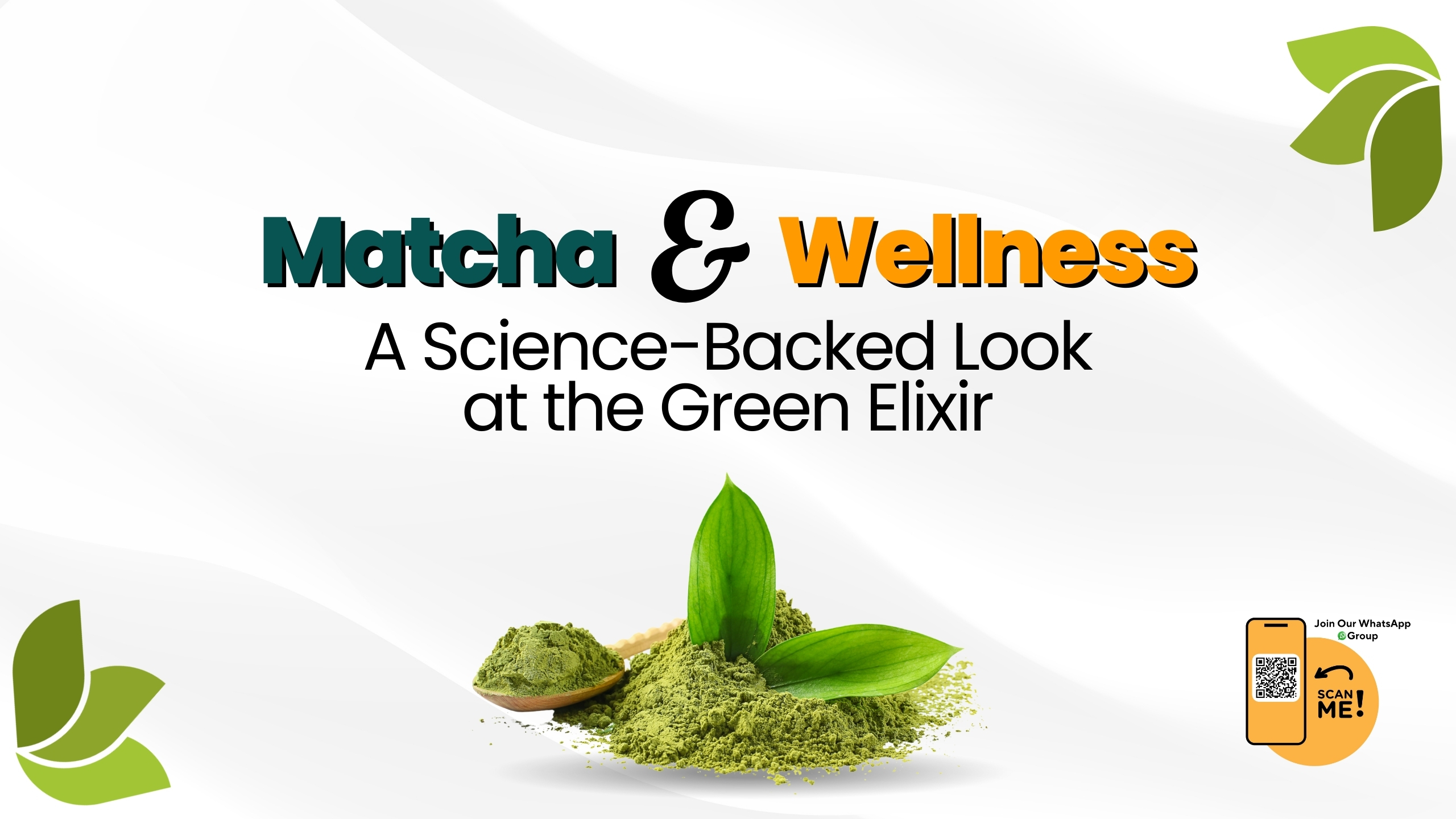Matcha, the finely ground powder of shade-grown green tea leaves, has transformed from a traditional Japanese beverage into a global wellness trend. Unlike regular green tea, where the leaves are steeped and discarded, matcha involves consuming the entire leaf, making it richer in bioactive compounds. But how much of its reputation for boosting health is backed by science?
- Nutrient and Phytochemical Profile
Matcha is particularly rich in:
- Catechins (EGCG – epigallocatechin gallate): A potent antioxidant associated with reduced oxidative stress, improved metabolic health, and potential anti-cancer effects.
- L-theanine: An amino acid that promotes calm alertness by increasing alpha brain wave activity, often balancing the stimulating effects of caffeine.
- Chlorophyll & Polyphenols: Higher than in regular green tea due to shade-growing, which increases chlorophyll and amino acid concentration.
- Cognitive Function and Mental Wellness
Several clinical studies indicate that the combination of caffeine + L-theanine in matcha enhances attention, memory, and reaction time more effectively than caffeine alone. This synergy helps explain why matcha is often described as producing “calm focus” rather than jittery energy.
- Stress and Mood Regulation
L-theanine appears to modulate stress responses by influencing GABA, dopamine, and serotonin pathways. Some small trials have shown that regular consumption of green tea extracts can reduce perceived stress and improve sleep quality. Matcha, being a concentrated source, may offer similar benefits when consumed in moderation.
- Metabolic and Cardiovascular Health
- Metabolism: EGCG has been linked with modest increases in fat oxidation and energy expenditure, especially when paired with exercise.
- Cardiovascular Benefits: Regular green tea consumption is associated with lower LDL cholesterol, improved endothelial function, and reduced hypertension risk. While specific matcha-only trials are limited, its concentrated catechins suggest a stronger effect than brewed tea.
- Potential Anti-Cancer Properties
In vitro and animal studies show EGCG can inhibit tumor growth, reduce angiogenesis, and promote apoptosis in cancer cells. Human data remain preliminary, but populations with high green tea intake have shown lower incidence of certain cancers (though confounders exist). Matcha may be a valuable adjunct in a preventive lifestyle, but not a replacement for medical care.
- Safety and Considerations
- Caffeine: A typical serving of matcha (~2g powder) provides ~60–70 mg caffeine—less than coffee, but more concentrated than regular green tea.
- Heavy Metals: Since the entire leaf is consumed, contaminants (e.g., lead) can accumulate. It’s best to choose high-quality, organic, and lab-tested matcha.
- Dosing: Evidence-based benefits generally align with 1–2 servings daily. Excessive intake may cause insomnia, stomach upset, or interact with medications (e.g., blood thinners).
- Beyond the Cup: Matcha in Lifestyle Science
Emerging research explores matcha’s role in eye health (anthocyanin-rich blends like “blue matcha”), gut microbiome modulation, and even as a functional food ingredient in smoothies, bars, and supplements. The science is young but promising, placing matcha at the intersection of nutrition, neuroscience, and lifestyle medicine.
- Science Meets Kitchen: Easy Matcha Recipes
💡 Evidence shows culinary use still preserves matcha’s bioactive compounds, provided high heat is avoided.
- Traditional Matcha Tea (Usucha Style)
- 1–2 tsp high-grade matcha
- 60–80 ml hot water (not boiling, ~80°C)
- Whisk in a zigzag motion until frothy
👉 Best for mental clarity and calm focus
- Iced Matcha Latte
- 1 tsp matcha powder
- 50 ml hot water (80°C)
- 200 ml cold milk (dairy or plant-based)
- Ice cubes, touch of honey or stevia if desired
👉 Cooling, refreshing, and antioxidant-rich summer drink
- Matcha Chia Pudding (overnight)
- 2 tsp matcha powder
- 2 cups almond or oat milk
- ½ cup chia seeds
- 1–2 tbsp maple syrup or honey
- Mix well, refrigerate overnight, top with berries
👉 Supports gut health, balanced energy release
- Matcha Energy Bites
- 1 cup rolled oats
- ½ cup nut butter
- 2 tbsp honey
- 2 tsp matcha powder
- 2 tbsp shredded coconut
- Mix, roll into balls, refrigerate
👉 Portable snack with fiber, protein, and antioxidants
Key Takeaway
Matcha’s wellness reputation is not just hype—its unique combination of catechins, caffeine, and L-theanine offers measurable benefits for brain health, stress balance, metabolic support, and possibly long-term disease prevention. Whether whisked into a traditional tea or blended into modern recipes, matcha is more than a ritual—it’s a science-backed ally for well-being.


